
Are you a medical student or a recent graduate eyeing a career in general surgery? Then, you might wonder whether your geographic preferences really matter in the residency match. How do general surgery residencies use geographic preferences? Are geographic preferences important to match?
In this article, we’ll dive into the importance of geography preferences in general surgery and how they can make a significant difference in your journey to match into a general surgery program. Look below to find the most important data from the most recent ERAS Program Director survey to learn more!
What are Geographic Preferences?
First things first, let’s clarify what geographic preferences mean. These preferences represent your desired locations or regions where you’d like to complete your residency. Maybe you have a fondness for a particular city, wish to stay close to family, or are keen on experiencing a specific medical environment – these all fall under geographic preferences.
In a nutshell, geographic preferences are your wish list of places where you’d love to do your medical residency. It’s like choosing your dream destination for your medical career. Just remember, while location matters, it’s just one piece of the puzzle. The goal is to find a residency program that not only fits your preferred location but also aligns with your career goals and aspirations.
What Are the Districts for Geographic Preferences in General Surgery?
Residency applicants can select up to three of the following nine divisions to be indicated as their geographic preference in the Supplemental ERAS Application. Applicants also need to write up to three short essays explaining each of their division preferences. There is also the option to select “I do not have a division preference”. To that, they can write a short essay describing their lack of division preference.
ERAS breaks up the residency locations into the following 9 geographic divisions: –
Northeast Region Divisions:
New England: Connecticut (CT), Maine (ME), Massachusetts (MA), New Hampshire (NH), Rhode Island (RI), Vermont (VT)
Middle Atlantic: New Jersey (NJ), New York (NY), Pennsylvania (PA)
Midwest Region Divisions:
East North Central: Indiana (IN), Illinois (IL), Michigan (MI), Ohio (OH), Wisconsin (WI)
West North Central: Iowa (IA), Kansas (KS), Minnesota (MN), Missouri (MO), Nebraska (NE), North Dakota (ND), South Dakota (SD)
South Region Divisions:
South Atlantic: Delaware (DE), District of Columbia (DC), Florida (FL), Georgia (GA), Maryland (MD), North Carolina (NC), South Carolina (SC), Virginia (VA), West Virginia (WV)
East South Central: Alabama (AL), Kentucky (KY), Mississippi (MS), Tennessee (TN)
West South Central: Arkansas (AR), Louisiana (LA), Oklahoma (OK), Texas (TX)
West Region Divisions:
Mountain: Arizona (AZ), Colorado (CO), Idaho (ID), New Mexico (NM), Montana (MT), Utah (UT), Nevada (NV), Wyoming (WY)
Pacific: Alaska (AK), California (CA), Hawaii (HI), Oregon (OR), Washington (WA)
To get a better picture of what these divisions look like, see the image below.
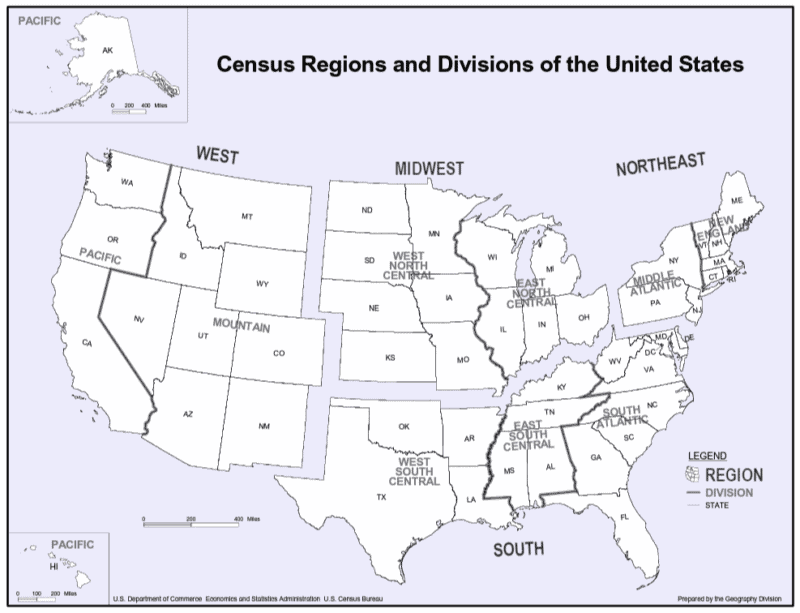
Regions and Divisions of the United States.
Urban and Rural Signaling In Supplemental ERAS
In the application process, applicants are given the opportunity to express their setting preferences, ranging from “Strong Preference for Rural” to “Strong Preference for Urban” using a 5-point rating scale. They can also choose “No Preference” or opt to skip the question entirely.
How Did General Surgery Programs Use Geographic Preferences in 2023?
In the 2022-2023 Supplemental ERAS Program Director Survey, general surgery PDs were asked about the importance of geographic preferences at each stage of the application process. You can see how general surgery PDs answered below along with the importance of each stage.
This table provides a clear breakdown of how geographic preferences were considered at each stage of the general surgery residency application review process.
| General Surgery: How important was the geographic preference information at each of the following stages of the application review process? | Did Not Use (%) | Used (%) | Not Important (%) | Somewhat Important (%) | Important (%) | Very Important (%) | Important or Very Important (%) |
|---|---|---|---|---|---|---|---|
| As a screening tool, before a more thorough application review | 15% (10) | 85% (56) | 18% (10) | 43% (24) | 34% (19) | 5% (3) | 39% (22) |
| Sending interview invitations to every applicant that selected my region | 44% (29) | 56% (37) | 65% (24) | 22% (8) | 11% (4) | 3% (1) | 14% (5) |
| Including in a composite filter to conduct holistic review | 23% (15) | 77% (50) | 36% (18) | 30% (15) | 24% (12) | 10% (5) | 34% (17) |
| As part of a holistic process to help decide who to interview | 6% (4) | 94% (62) | 11% (7) | 47% (29) | 27% (17) | 15% (9) | 42% (26) |
| As a tie breaker when deciding who to interview | 17% (11) | 83% (55) | 25% (14) | 36% (20) | 25% (14) | 13% (7) | 38% (21) |
| To prepare for the interview | 30% (20) | 70% (46) | 50% (23) | 26% (12) | 22% (10) | 2% (1) | 24% (11) |
| Plan to use during ROL discussion | 28% (18) | 72% (47) | 34% (16) | 38% (18) | 21% (10) | 6% (3) | 28% (13) |
| Other | 76% (13) | 24% (4) | 75% (3) | 0% (0) | 25% (1) | 0% (0) | 25% (1) |
Importance of Geographic Preferences as a Screening Tool in General Surgery
Before selection for interview invites begins, programs must first screen applications to decide who would (or would not) be a good candidate for holistic review. General surgery was at the bottom of specialties surveyed with 39% of PDs finding geographic preferences to be important or very important as a screening tool.
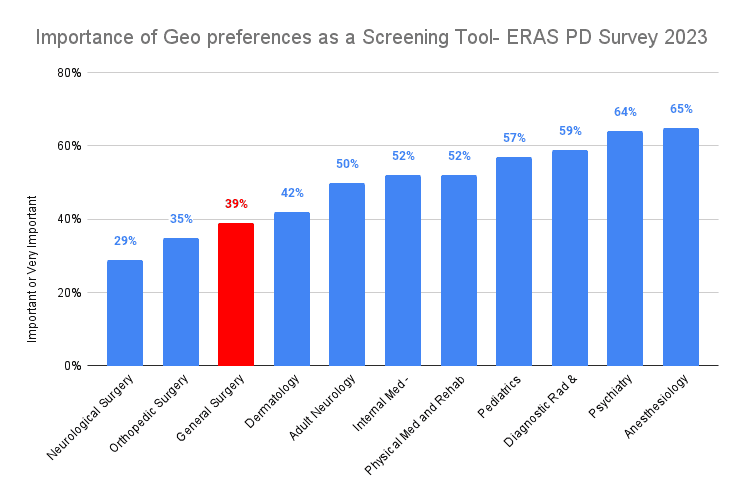
General Surgery PDs Did Not Rely Heavily on Geographic Preferences as a Screening Tool
Importance of Geographic Preferences as Part of Holistic Review in General Surgery
While screening is the first hurdle for most applications, holistic review is where your experiences and application as a whole can be properly evaluated. General surgery was third from the bottom with 34% of general surgery PDs thinking geographic preferences were important or very important.
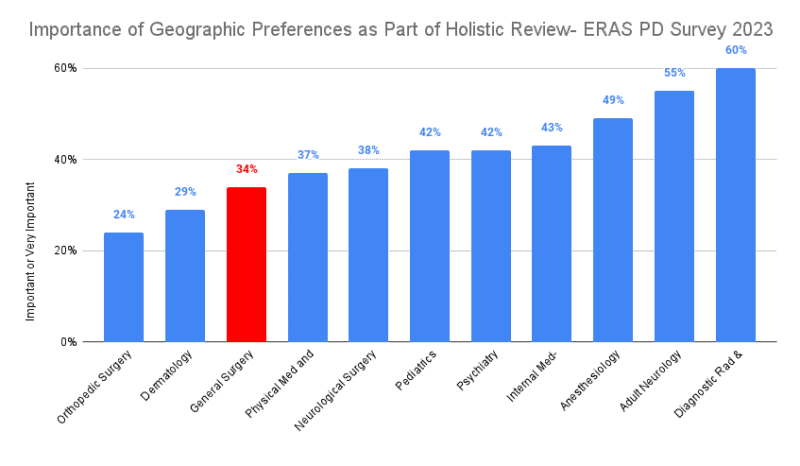
General surgery PDs were moderately reliant on geographic preferences for holistic review
Importance of Geographic Preferences as a Tie Breaker in General Surgery
When deciding between two equal applicants to interview, all specialties found geographic preferences to be important as a tie breaker. Around 38% of general surgery PDs found geographic preferences as important or very important as a tie breaker. Interestingly, 83% of general surgery PDs actually used it as a tie breaker.
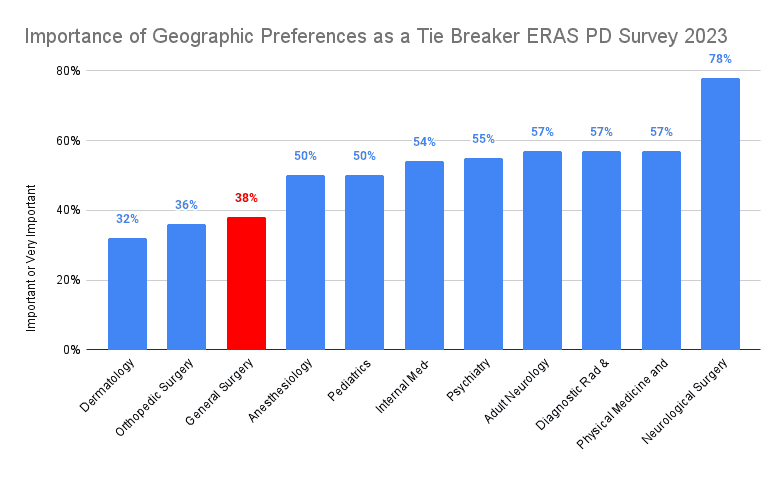
38% of general surgery PDs reported that geographic preferences were useful in deciding between candidates
Should I Use Geographic Preferences in General Surgery Applications?
Now that we’ve established the importance of geographic preferences, let’s explore how you can make the most of them in your general surgery program applications. Do residency applications without geography preferences get treated differently?
The answer is, it depends.
PDs were asked if applicants who had geographic preferences were treated differently than those without any geographic preferences. We can assume this means that at some point in the application review process, geographic preferences were considered. In the graph below, we can see that in general, all specialties’ PDs considered no geographic preference as meaning the applicant was willing to go anywhere. A whopping 70% of general surgery PDs thought the same but it was on the lower side of surveyed residencies.
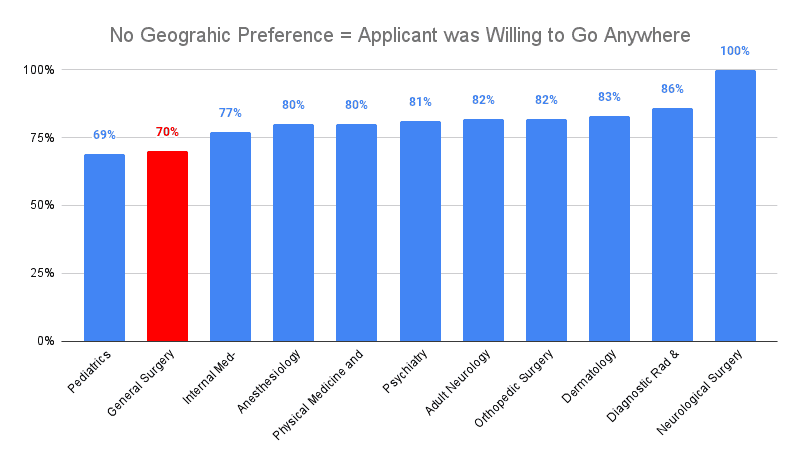
PDs in general surgery often interpreted no geographic preference as meaning the applicant was willing to go anywhere
General surgery was near the lower end of all specialties with 83% of PDs treating no-geo-preference applicants differently than those who had geographic preference.
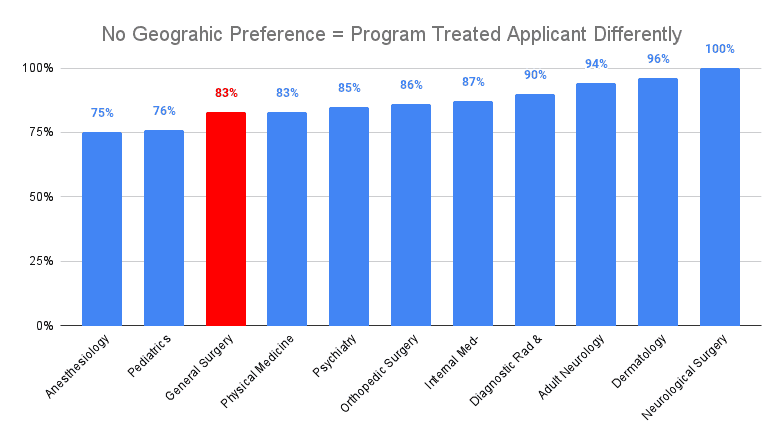
General surgery ranked near the lower end of treating no-geo-preference applicants differently
You can see the all results for general surgery and all specialties in the table below.
| All specialties PD interpretation of no geographic preference | Adult Neurology | Anesthesiology | Dermatology | Diagnostic Rad & Interventional Rad | General Surgery | Internal Med - Categorical | Neurological Surgery | Orthopedic Surgery | Pediatrics | Physical Med and Rehab | Psychiatry |
|---|---|---|---|---|---|---|---|---|---|---|---|
| Applicant was less interested in my program’s region | 6% | 5% | 17% | 13% | 6% | 10% | 0% | 5% | 3% | 27% | 8% |
| Applicant was less interested in my program | 0% | 2% | 4% | 13% | 2% | 2% | 0% | 5% | 3% | 0% | 5% |
| Applicant was willing to go anywhere | 82% | 80% | 83% | 86% | 70% | 77% | 1% | 82% | 69% | 80% | 81% |
| Applicant was more interested in factors other than in geography | 42% | 48% | 38% | 54% | 42% | 42% | 33% | 27% | 53% | 47% | 42% |
| Applicant was hesitant or unwilling to provide a response | 21% | 18% | 42% | 22% | 17% | 27% | 22% | 18% | 22% | 33% | 17% |
| Did not draw any conclusions | 18% | 20% | 8% | 13% | 34% | 24% | 0% | 32% | 22% | 20% | 19% |
| Treated applicant with blank geographic preference the same applicants who preferred my region | 6% | 25% | 4% | 10% | 17% | 13% | 0% | 14% | 24% | 17% | 15% |
| Other | 0% | 0% | 4% | 1% | 2% | 1% | 0% | 0% | 0% | 3% | 3% |
What are the Advantages of Geographic Preferences?
- Selecting a program in a location that aligns with your preferences can significantly improve your overall comfort during residency
- Proximity to family and friends can be invaluable during the demanding residency period.
- Geographic preferences can also help you build local professional networks. These connections can be beneficial for future career opportunities, referrals, and collaborations..
- Different regions offer unique patient populations and medical challenges. If you have a specific interest in serving certain demographics or addressing particular healthcare issues, your geographic preference can align with those career goals.
- Consider lifestyle factors like climate, cost of living, and recreational opportunities when choosing a location. Residing in a place that matches your preferred lifestyle can contribute to your overall happiness and well-being.
- If you have long-term plans to practice medicine in a particular region, starting your career there during residency can be advantageous
Strategic approaches to effectively using geographic preferences
- Spend time researching programs that align with your geographic preferences. Look beyond location to assess factors like program reputation, faculty expertise, and available resources.
- In your application materials, clearly communicate why your chosen geographic region is significant to you. Whether it’s because of personal ties, a desire to serve a specific community, or access to unique patient populations, make your motivations known.
- While having strong geographic preferences is understandable, some flexibility can increase your chances of matching. Consider a range of locations that would still be acceptable to you.
- While geographic preferences can be a valuable factor, remember that they’re just one piece of the puzzle. Your qualifications, clinical experiences, and interview performance all play significant roles in the application process. Ensure that your geographic preferences don’t overshadow these essential aspects of your application.
- If you have a strong preference for a specific region, try to build connections there.
Conclusion
In the competitive world of residency matching, geographic preferences can be your secret weapon. They offer insight into your motivations, and can potentially tip the scales in your favor. Remember to strategically use your geographic preferences. With the right approach, you can increase your chances of matching into a program that aligns perfectly with your geographic preferences.
While geography preference may play a larger role, it isn’t likely to increase matching chances more than having a well-rounded application. This includes avoiding any failed Step tests and getting the highest Step 2 CK score possible.
If you are feeling overwhelmed, you aren’t alone. We offer free consultations for students to help identify what is them back and how best to break through to help match into their dream residency. If you need to talk, book a consultation today and receive free lectures and Anki cards from the Yousmle Library on the topics students struggle with most!







